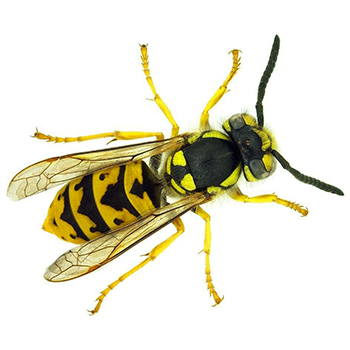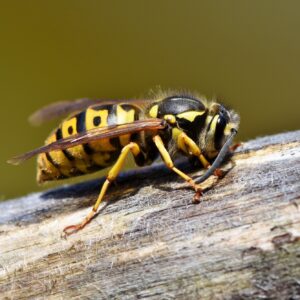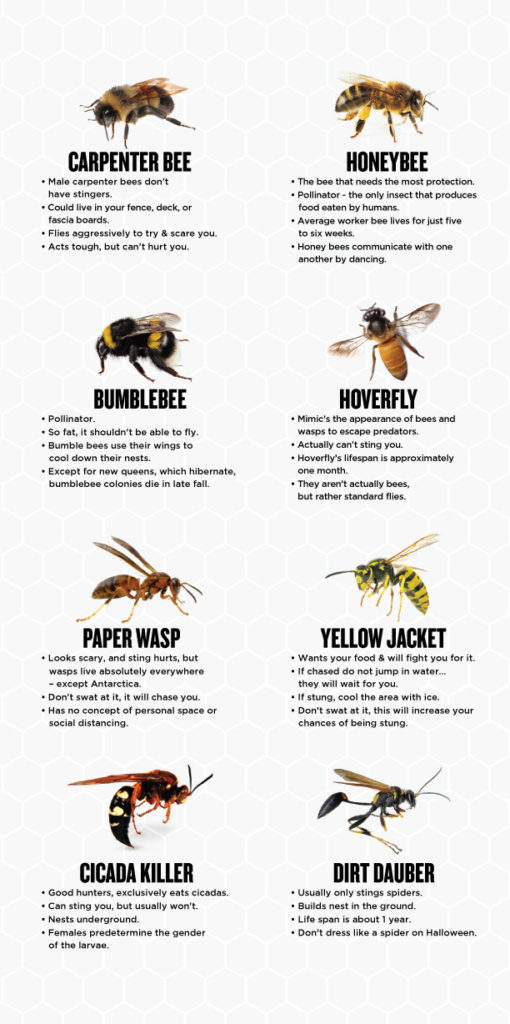When to call a Wasp Exterminator & Pest Control Professional

When it comes to pests, wasps can be some of the peskiest insects to infest your home or business in Delaware, Pennsylvania, Maryland, and New Jersey. It’s not unusual for a wasp nest to develop in or around your property, but it may take you time to notice, depending on where the wasp nest is built. In order to avoid allowing the infestation to get out of control, it’s best to understand how to identify a possible wasp problem from the beginning. To protect your home or business from wasps, you need to learn about the behavior of this pest, take steps for prevention, and find effective wasp extermination options should an infestation occur.
What Are Wasps?
The wasp control experts at Viking Pest explain wasps are small insects that share traits with both bees and ants, although many people believe they are a type of bee. Wasps differ from bees in that they have more narrow bodies and aren’t fuzzy. The shape of their heads resembles that of ants, but wasps have wings. The size of wasps ranges from 0.5 to nearly 2 inches in length, depending on if they are workers or queen wasps.
How Do I Identify Wasps?
In Maryland, New Jersey, Pennsylvania, and Delaware, the most common types of wasps that you’ll identify are yellow jackets, hornets, and paper wasps, though there are other types of wasps throughout the four states. Yellow jackets are the most recognizable as they have yellow and black stripes and most closely resemble bees. Hornets are often more orange in color, and paper wasps are a brownish shade and smaller in size than other wasps.
Typically, the first signs of a wasp infestation are nests somewhere near your home or business property. You may also identify a wasp issue if you’ve noticed a number of the insects flying around your house or office building. Wasp pest control experts at Viking Pest explain the nests look like honeycombs, but they’re small and somewhat rounded. You’ll usually find them outside, but they can make their way into your home or building, which is a much more serious type of infestation. When wasps are building their nests, they’re looking for a place that’ll shelter their young, so structures such as sheds, window frames, and decks are popular spots for wasp nests.
“The species of wasp most commonly seen in our service area is an invasive species from Europe, the European paper wasp,” says Craig S., ACE, PHE and Viking Pest’s Service Director. “It was introduced to the US in the 1970s and has largely chased out the native Northern Paper Wasp. European Paper wasps now occur in the Northeast, Southeast, California, Washington, and Idaho. Native wasps tend to be more black and brown while the invasive species is more yellow and black.”
How Did I Get Wasps?
If you’ve noticed wasps inside your Delaware, New Jersey, Pennsylvania, or Maryland home or business, it’s likely they’re finding their way in through holes or gaps in your structure. Wasps may be attracted to your property for a number of reasons. Wasp exterminators explain gutters are one of their favorite places to nest, so these insects are naturally attracted to spaces like this. These flying pests may also be attracted to your home or business in New Jersey, Pennsylvania, Maryland, or Delaware if you have a lot of flowers or plants close by. Any other door space with food or drink residue will pique their interest.

What Are the Effects of Wasps in and Around My Home or Business?
The most frustrating consequence of a wasp infestation is the possibility of stings, especially for people who are allergic, which could be deadly. Yellowjackets and paper wasps are the most likely to sting if provoked. Although many people fear wasp stings, these insects are unlikely to sting you unless they feel threatened, but it can be exhausting to worry about the possibility of stings every time you’re outside or walking into your home or business. If the wasps have made it inside your property, the potential for stings is even greater.
How Long Do Wasps Live?
 The lifecycle of a wasp can vary with the queens living up to an entire year. On average, worker wasps can live between 12 to 22 days, but this depends on the species. Wasp exterminators at Viking Pest explain that in Delaware, Maryland, New Jersey, and Pennsylvania, most wasps lay their eggs in the spring or summer, which is why it’s more typical to have wasp infestations during these times of the year.
The lifecycle of a wasp can vary with the queens living up to an entire year. On average, worker wasps can live between 12 to 22 days, but this depends on the species. Wasp exterminators at Viking Pest explain that in Delaware, Maryland, New Jersey, and Pennsylvania, most wasps lay their eggs in the spring or summer, which is why it’s more typical to have wasp infestations during these times of the year.
How Do I Prevent Wasps?
There are many dangers associated with DIY wasp removal. Wasps can be very aggressive when defending their nests, and trying to remove a wasp nest from your home or business on your own by knocking it down with a bat or other implement, could lead to wasp stings. Wasps could sting several times since they don’t lose their stringers from the first string, and this could land you in the hospital, especially if you’re not aware of a wasp sting allergy. Trying to remove the nest could also spread the wasps around the area and put others in danger of strings. Depending on where the nest is, the pests could move to your indoor areas, further putting family, pets, or customers in harm’s way.
A recommended method of wasp pest control is to clean up any outdoor area of drink or food and be sure you’re not leaving behind easily accessible trash. Reach out to a pest control expert, like Viking Pest, as we have the proper equipment and are trained to properly control wasps. Wasp extermination can be tricky, and if it’s not done just right, you may end up dealing with a colony of angry wasps.
Frequently Asked Questions About Wasps















